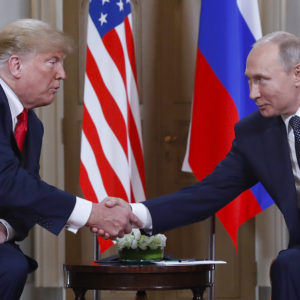Regardless of what President Trump said — or meant to say — when he met with Russian President Vladimir Putin in Helsinki, the United States is now weaker.
The political firestorm has featured prominent members from both parties sharply criticizing the president for his failure to hold Russia accountable for its malicious behavior and choosing the word of the Russian president over that of U.S. intelligence agencies regarding Russian interference in the 2016 U.S. election.
Republican senator John McCain described President Trump’s performance “disgraceful,” and former Republican Speaker of the House Newt Gingrich called it a “serious mistake.” On the Democratic side, Senate Minority Leader Chuck Schumer called the president’s statements “shameful,” and former Defense Secretary Ash Carter said it was like “watching the destruction of a cathedral.”
Even members of the Trump administration are contradicting the president’s repeated attempts to cast doubt over Russia’s interference in the 2016 U.S. elections and the prospects of future Russian meddling. For instance, Director of National Intelligence Dan Coats reiterated the U.S. intelligence community’s assessment that Russia interfered in the 2016 elections and recently stated that Russia is continuing efforts to interfere in America’s democratic processes. Additionally, White House press secretary Sarah Huckabee Sanders stated the president actually agrees with Coats.
Beyond the politics, the real world implications of Trump’s meeting with Putin and remarks in Helsinki are stark: The U.S. intelligence community’s already demanding job became even more challenging — which weakens the United States’ ability to ensure our national security.
First, sources are going to be more difficult to cultivate. Much of what we know about Russia’s interference in the 2016 elections, including the level of Putin’s involvement, comes from human sources. Such sources agree to work with U.S. intelligence agencies for a number of reasons, but among the most prominent is what we stand for: democracy, freedom and the rule of law. If the United States is perceived to be warming to autocrats, ridiculing democratic allies, and failing to stand up to international rules and norms, then sources will be less likely to risk their lives to work with American intelligence officers.
Second, our allies are growing increasingly wary. The United States often shares intelligence with key allies — and has received key pieces of intelligence from close allies.
However, if America’s allies perceive the United States to have different interests than them, or working at cross-purposes, then they may be less likely and willing to share key intelligence with the United States.
Given Trump’s antagonistic comments toward traditional allies like Canada and Germany — in addition to his statement that the European Union is a “foe,” only to greet Putin warmly days later — it is unsurprising that the leaders of many American allies are now reassessing how they engage the United States. And that reassessment may lead to decreased intelligence cooperation.
Third, Trump is undermining our diplomatic corps. Reports suggest Trump had been considering a “deal” that would allow Russian officials to interrogate American citizens, including diplomats. Such an arrangement is unprecedented and outrageous. All Americans deserve the full protection of the U.S. government — the notion that the U.S. government would even consider allowing a foreign power, particularly an adversarial one, to question Americans is chilling.
The only apparent gain from the meeting appears to be one Trump fashions for himself. Trump believes that any suggestion of Russian interference delegitimizes his presidency. If Russia interfered in the 2016 election, then his election victory is tainted — and Trump is unwilling to allow that possibility to go unchallenged. In Helsinki, Trump emphasized, “I beat Hillary Clinton easily,” and in the ensuing days, he repeatedly stated, “There was no collusion.”
To refuse to accept the conclusion of U.S. intelligence agencies and hang American diplomats out to dry because it may tarnish an election victory is a blatant case of placing selfish political ends over the national security interests of the United States. In the absence of the president placing America’s national security first, Congress must act — by reaffirming the intelligence community’s findings, protecting our diplomats, and working to secure our elections.

